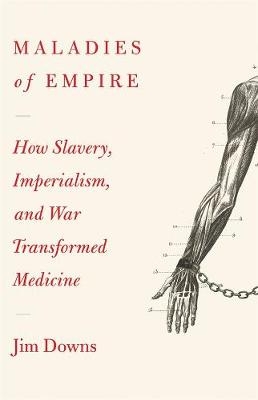
Maladies of Empire
How Colonialism, Slavery, and War Transformed Medicine
Seiten
2021
Harvard University Press (Verlag)
978-0-674-97172-1 (ISBN)
Harvard University Press (Verlag)
978-0-674-97172-1 (ISBN)
Standard histories of infectious disease celebrate brilliant minds such as Florence Nightingale, John Snow, and Robert Koch. In this unorthodox telling, Jim Downs focuses on a forgotten group of contributors: the conscript soldiers, colonial subjects, and enslaved people whose bodies were the experimental matter on which medical progress relied.
A sweeping global history that looks beyond European urban centers to show how slavery, colonialism, and war propelled the development of modern medicine.
Most stories of medical progress come with ready-made heroes. John Snow traced the origins of London’s 1854 cholera outbreak to a water pump, leading to the birth of epidemiology. Florence Nightingale’s contributions to the care of soldiers in the Crimean War revolutionized medical hygiene, transforming hospitals from crucibles of infection to sanctuaries of recuperation. Yet histories of individual innovators ignore many key sources of medical knowledge, especially when it comes to the science of infectious disease.
Reexamining the foundations of modern medicine, Jim Downs shows that the study of infectious disease depended crucially on the unrecognized contributions of nonconsenting subjects—conscripted soldiers, enslaved people, and subjects of empire. Plantations, slave ships, and battlefields were the laboratories in which physicians came to understand the spread of disease. Military doctors learned about the importance of air quality by monitoring Africans confined to the bottom of slave ships. Statisticians charted cholera outbreaks by surveilling Muslims in British-dominated territories returning from their annual pilgrimage. The field hospitals of the Crimean War and the US Civil War were carefully observed experiments in disease transmission.
The scientific knowledge derived from discarding and exploiting human life is now the basis of our ability to protect humanity from epidemics. Boldly argued and eye-opening, Maladies of Empire gives a full account of the true price of medical progress.
A sweeping global history that looks beyond European urban centers to show how slavery, colonialism, and war propelled the development of modern medicine.
Most stories of medical progress come with ready-made heroes. John Snow traced the origins of London’s 1854 cholera outbreak to a water pump, leading to the birth of epidemiology. Florence Nightingale’s contributions to the care of soldiers in the Crimean War revolutionized medical hygiene, transforming hospitals from crucibles of infection to sanctuaries of recuperation. Yet histories of individual innovators ignore many key sources of medical knowledge, especially when it comes to the science of infectious disease.
Reexamining the foundations of modern medicine, Jim Downs shows that the study of infectious disease depended crucially on the unrecognized contributions of nonconsenting subjects—conscripted soldiers, enslaved people, and subjects of empire. Plantations, slave ships, and battlefields were the laboratories in which physicians came to understand the spread of disease. Military doctors learned about the importance of air quality by monitoring Africans confined to the bottom of slave ships. Statisticians charted cholera outbreaks by surveilling Muslims in British-dominated territories returning from their annual pilgrimage. The field hospitals of the Crimean War and the US Civil War were carefully observed experiments in disease transmission.
The scientific knowledge derived from discarding and exploiting human life is now the basis of our ability to protect humanity from epidemics. Boldly argued and eye-opening, Maladies of Empire gives a full account of the true price of medical progress.
Jim Downs is Gilder Lehrman–National Endowment for the Humanities Professor of Civil War Era Studies and History at Gettysburg College. He is the editor of Civil War History and author and editor of six other books, including Sick from Freedom: African-American Illness and Suffering during the Civil War and Reconstruction.
| Erscheinungsdatum | 05.11.2020 |
|---|---|
| Zusatzinfo | 2 photos |
| Verlagsort | Cambridge, Mass |
| Sprache | englisch |
| Maße | 156 x 235 mm |
| Gewicht | 567 g |
| Themenwelt | Geisteswissenschaften ► Geschichte ► Allgemeine Geschichte |
| Studium ► Querschnittsbereiche ► Geschichte / Ethik der Medizin | |
| Naturwissenschaften | |
| Sozialwissenschaften ► Ethnologie | |
| Sozialwissenschaften ► Politik / Verwaltung ► Politische Theorie | |
| Sozialwissenschaften ► Soziologie | |
| ISBN-10 | 0-674-97172-8 / 0674971728 |
| ISBN-13 | 978-0-674-97172-1 / 9780674971721 |
| Zustand | Neuware |
| Informationen gemäß Produktsicherheitsverordnung (GPSR) | |
| Haben Sie eine Frage zum Produkt? |
Mehr entdecken
aus dem Bereich
aus dem Bereich
Die Geschichte eines Weltzentrums der Medizin von 1710 bis zur …
Buch | Softcover (2021)
Lehmanns Media (Verlag)
CHF 27,90
von der Antike bis zur Gegenwart
Buch | Softcover (2024)
C.H.Beck (Verlag)
CHF 16,80
Krankheitslehren, Irrwege, Behandlungsformen
Buch | Softcover (2024)
C.H.Beck (Verlag)
CHF 55,90


